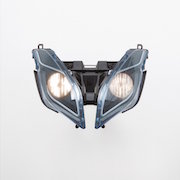In the summer of 2010, Nils Bech was the headliner on the smallest stage at Slottsfjell Festival, then a growing player in Norway’s outstanding festival scene, taking place about an hour south of Oslo. So small was this stage that it was little more than an open-walled shed, with performers offered hardly any elevation above their audience. This led, as Bech launched himself into some of his more suggestive dance moves, to various drunken punters ‘jokingly’ groping the singer as he clambered up and down the stage prop he was then synonymous with, his beloved stepladder.
Bech was a marvel that night, performing songs from his debut LP Look Back, acting out its emotional journey with the ladder affording him options for his improvised dance and an array of ‘dramatic’ poses for singing his bittersweet songs. The crowd grew, he and his saxophonist became more animated, shed clothing, and arrived at a sweaty intensity that was far beyond any of the bigger names on the festival bill, which included Kelis and Belle and Sebastian.
It’s strange to think of that performance now for two reasons. Firstly, Bech playing a rock festival seems incongruous; in the years since then he has firmly positioned himself on the awkward cusp of pop and performance art. With ladder or other props (plants, pedestals, art works) in tow, a typical Bech show would take place in a modern art gallery – or indeed inside of a James Turrell sculpture, as occurred in August in Oslo. Not amid the unwashed at a festival.
Secondly, the songs from Look Back seem flippant and frivolous (but still terrific fun) compared to this new record. Look Back featured ‘Contemporary Dancing’, his infectious, silly, charming tribute to his own performance spectacle. It was a joyful album of hedonism, sex and flamboyant electronica. It was also the world’s introduction to Bech’s classically trained voice, which couldn’t help but convey a refinement born of an operatic background. It was a curious mix.
Now Bech is 35, and there is a maturity and urgency to his lyrics and a minimalism to each instrumental arrangement that has produced a mostly beautiful, occasionally frustrating, always compelling fourth album. The crucial ingredient in this darker aesthetic is producer Drippin, a fellow Norwegian who has stripped away some of the unnecessary sonic fripperies of Bech’s previous albums to embrace large, loud, low swathes of synth and a new, more aggressive percussiveness, as evidenced on opener ‘Waiting’. The combination has certain suggestions of DFA labelmates The Juan Maclean as well as, predictably, M83.
Drippin is an inventive, experimental presence throughout Echo, his oceanic and expansive sense of electronica elevating Bech’s songs thanks to an intuitive sense of space and controlled abandon. But it takes a few listens to appreciate the producer’s contributions, as it is Bech’s markedly improved songwriting that takes centre stage initially. ‘Waiting’ is the first of a slew of lusciously catchy songs, most of which bear an emotional heft far weightier than, say, ‘Contemporary Dancing’. ‘Jealousy’, a song from his 2014 album One Year re-recorded here in a softer, better incarnation, is particularly lovely, as is the sad ‘Please Stay’, with its flavours of George Michael circa Older.
Bech’s vocal range is such that pretty much nothing, within reason, is off limits in the higher registers, and his boy soprano tendencies rear their head spectacularly on the album’s title track, on which Drippin layers and loops Bech’s falsetto in a way that sounds like Lakme by way of Enya. This track includes perhaps the only real misstep by Drippin, with the elaborate background of ethereal choral voices somewhat interfering with the unadorned sharpness that defines the record’s best moments.
Another polarising track is ‘Glimpse of Hope’, a satisfying enough example of Bech’s concise melodic gifts, yet encapsulating an aspect of his music that has invited both praise for its idiosyncrasy and criticism on the basis that it is cloyingly irritating. This is the strong Norwegian accent that wraps itself around these English lyrics. It is only really a factor on this song, and while it may at times be a little shrill, this is really part of his persona as performance artist as much as anything, and is certainly not overbearing.
Because pretty much everything Bech has done up until now has been highly conceptual. His 2014 album One Year, for example, chronicled the first year of his real-life relationship with his partner. Echo is less bound to such a narrative, but the songs are similarly personal and intimate regarding what sounds like Bech’s passionate but destructive connection with this mysterious other. Going by the lyrics of Echo, the relationship of One Year crumbled, with this album dealing with the aftermath and the singer’s regret, longing and on ‘Glimpse of Hope’, conflict over reuniting. As clichéd or trite as all this might seem, it is hard not to be moved by the tenderness and especially the innocence with which he approaches these dilemmas, and naturally it helps that the songs are so good. The hard edges provided by Drippin also serve to prevent anything too syrupy.
Nevertheless, Bech’s music to some might seem full of turgid melodrama and indulgent wallowing. Yet he is a genuine original, innovative in sound and, I think it’s just about fair to say, sincere in spirit. Whether draping himself over a stepladder in the recherché surrounds of a gallery space or exploring the possibilities of his digital pop opera with such a collaborator as Drippin, Bech will provoke a reaction one way or another.


